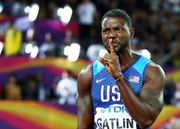Justin Gatlin opens up on his dark struggles dealing with depression following his four year ban, giving one dark story that could have led him to the brink of death that made him change his life.
American sprint icon Justin Gatlin has shared emotional details about his infamous doping ban in 2006 and the profound struggles he endured during his suspension from the sport he loved.
Once celebrated as an Olympic and world champion, Gatlin’s life took a sharp turn when he faced allegations of doping, leading to a four-year ban that plunged him into despair.
In the early 2000s, Gatlin was at the pinnacle of his career. After clinching Olympic gold in the 100m at the Athens 2004 Games, he followed it up with an impressive double—winning the 100m and 200m at the 2005 World Championships in Helsinki.
Justin Gatlin has reflected on his second doping ban back in 2006, and the level of hate he had to endure clawing his way back to the top on return to the sport in 2010.
He was adored by fans and hailed as one of the fastest men alive. But in 2006, Gatlin tested positive for testosterone or its precursor, shattering his reputation and leaving him ostracized by the athletics community.
“It was big. I am Olympic and World champion. I broke the world record. I was getting a lot of buzz and press,” Gatlin recalled to Run Your Race. “I was hanging out with the who’s who—Hollywood guys. I was going to a lot of parties. But as soon as everything started falling apart, a lot of people stopped picking up their phones.”
The fallout was devastating. Gatlin admitted to crying himself to sleep every night during the first year of his suspension. Despite support from his parents, the emotional toll was unbearable.
“I felt like I was in a nightmare and not waking up. I couldn’t show my parents how much I was hurting—they were my rock. It would have broken them to see me like that,” he said.
![[LIST] The 10 fastest 60-metres indoor sprinters of all time](https://sportal365images.com/process/smp-images-production/ringier.africa/11012025/956cec47-3ead-460f-9ff0-58844081a6a5.jpg?operations=fit(180:))
From Noah Lyles to Christian Coleman, we take a look at the 10 fastest 60-meter dash male sprinters of all time.
To cope, Gatlin moved back home to North Carolina. He tried to maintain a semblance of normalcy by training and volunteering with high school athletes. Yet, the shame of his situation weighed heavily on him.
“I went through my whole ordeal that first year and was never more embarrassed in my life. I wished I could never be me anymore,” he admitted.
Gatlin sought solace in nightlife, immersing himself in a reckless cycle of partying and heavy drinking. His friendships shifted, and he found himself surrounded by people who enabled his destructive behavior.
“I partied a lot. I was slamming seven to eight Jägerbombs every weekend and drinking in between. Sometimes I’d wake up not knowing whose house I was at because I didn’t want to be me anymore. It was happiness at a fleeting moment.”
)
The now-retired 2017 100m World Champion has revealed how beating Usain Bolt in 2017 boosted his appearance fees for the remainder of that season.
One harrowing night proved to be a turning point. After leaving a Pensacola nightclub intoxicated, Gatlin narrowly avoided a DUI and a potential tragedy.
“I was so drunk, my vision was blurry. I rolled over a boulder, and a cop pulled me over. Somehow, I dodged that. But later, on a bridge, I realized how close I was to losing my life. I could have flipped over into the water, and no one would have known.”
That night was a wake-up call. Gatlin realized he couldn’t continue living recklessly, not only for himself but for the sake of his parents. “As much pain as I delivered, the pain I was going through would have destroyed my parents if I had killed myself or gone to jail.”
Gatlin eventually returned to the sport, going on to win medals and regain his place among the world’s elite sprinters. His story is one of resilience and redemption, a testament to the human capacity to rise after falling from grace.









